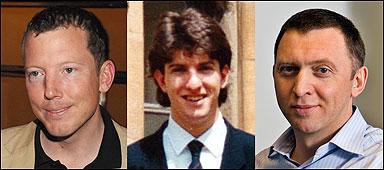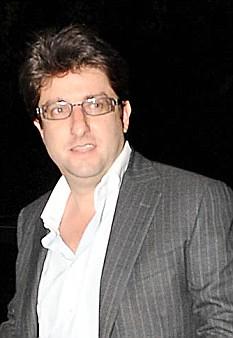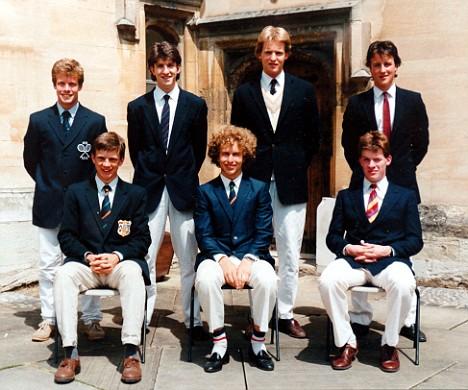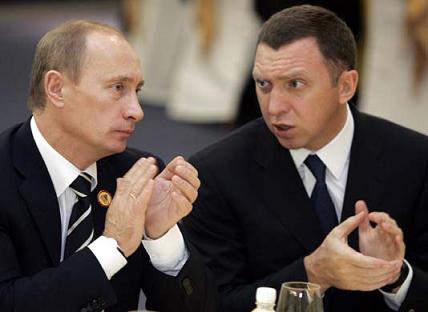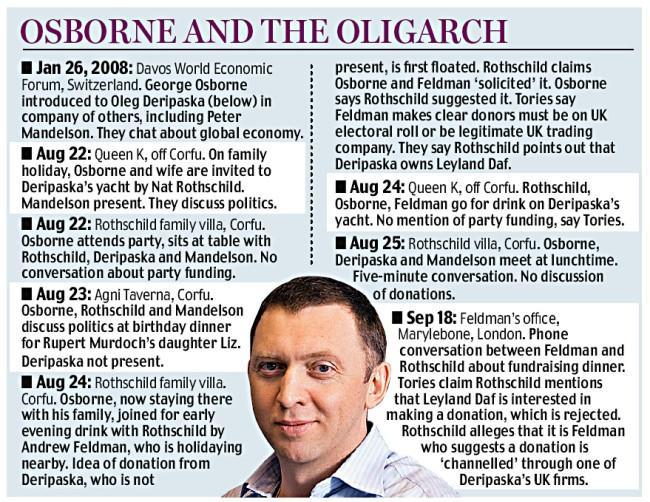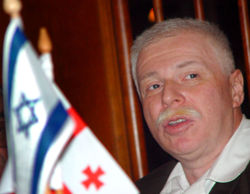The "Yachtgate" affair
Russian Jewish Mobster colludes with British Jews from Labour and the Conservatives
...and Rothschild is the intermediary
From left to right; Nat Rothschild, Andrew Feldman, Oleg Deripaska
Nathaniel Rothschild, son of prominent British Jew Lord Jacob Rotschild, and a friend of media Zionist Rupert Murdoch, invites Jewish mobster from Russia, Oleg Deripaska - the man behind the "aluminium wars" - for secretive talks aboard Rothschild´s private yacht in Corfu. Talks that are held between the mafia-Jew Deripaska and the Labour-Jew Lord Peter Mandelson and David Cameron´s money-Jew Andrew Feldman, the Tory party chief executive, and George Osborne, the Tory Shadow Chancellor.
It is suspected Mandelson has helped out Deripaska with aluminium tarrifs when he was a EU commissioner and Deripaski was also to give funds to the Conservative Party.
Nathaniel´s father Jacob Rothschild already has shown his inclination to help his Jewish oligarch brethren and has cooperated with the criminal Jewish oligarch of Yukos in Russia, Mikhail Khodorkovsky. Jacob´s son now follows in the same vein...
Jacob Rothschild is chairman of Yad Hanadiv, the Rothschild foundation, which built and gave the Knesset government buildings and the Supreme Court to Israel, and chairs the Jewish Policy Research, dedicated to promoting issues affecting Jews worldwide.
Here follows a couple of articles on this scandal:
- Reputations and friendships at risk in tit-for-tat allegations
- Lord Mandelson and Oleg Deripaska dined together 'a year before they met’
- Peter Mandelson oligarch Oleg Deripaska linked to mafia boss
- Israel Police: Oleg Deripaska Wiretapped Chernoy, Lieberman
- Timeline - Osborne and the oligarch
- To survive the aluminium wars, mettle was needed
- Short postscript by Radio Islam
Reputations and friendships at risk in tit-for-tat allegationsBy Sam Coates and Francis Elliott
The Times, October 21, 2008
The verdant olive groves of northeastern Corfu, which obscure the stuccoed villas and the view of yachts moored along the coast, are not a world used to celebrity attention. This is precisely why they are a regular haunt of the reclusive wealthy.
On the only road between Aghios Stefanos and Kerasia, is the villa of Jacob and Serena Rothschild, scions of the banking dynasty. The odd snippet of life beyond the walls has crept into the public domain - it boasts a marble enclosed pool, artificial waterfalls and, according to the owner, “one of the most spectacular marine views in the world”. But for a decade it has remained a secluded retreat for the Rothschilds, free from prying outside eyes.
The return of Lord Mandelson, the Rothschilds’ close friend, to government at the start of this month has, however, sparked an extraordinary firestorm that has put events on the island this summer at centre stage. These tit-for-tat allegations have devastating consequences for the reputations - and the friendships - of those involved.
They exploded a week ago when The Sunday Times reported that Lord Mandelson had stayed on the yacht of Oleg Deripaska, Russia’s richest man, who built his fortune in the aluminium industry.
Lord Mandelson first said that he was merely attending a drinks party hosted by Mr Deripaska. He then said that he had last seen Mr Deripaska at a dinner hosted by Rupert Murdoch in Corfu. Mr Murdoch, chairman of News Corporation, which owns The Times, was in the island for a family gathering to celebrate the 40th birthday of his daughter Elisabeth.
It subsequently emerged that Lord Mandelson and other guests were “billeted” on board Mr Deripaska’s £80 million yacht because Nathaniel Rothschild, the hedge fund manager and son of Lord and Lady Rothschild, had run out of room at his house.
Lord Mandelson’s decision to stay on the yacht, with its 21 crew, has prompted questions over whether he has been too close to the aluminium tycoon, and whether their relationship had any bearing on his role at the time as EU Trade Commissioner. Lord Mandelson and the commission have strenuously rejected this.
A week earlier, it had been revealed that Lord Mandelson and George Osborne, the Shadow Chancellor - supposedly political enemies - met for dinner on the island. They were said to have compared notes on Gordon Brown at a £50ahead family-run restaurant, the Agni taverna.
Lord Mandelson allegedly told the Shadow Chancellor that Mr Brown had presided over a “culture of debt” and was said to have “dripped poison” into Mr Osborne’s ear. This was weeks before he accepted Mr Brown’s invitation to join the Government. When confronted on television, Mr Osborne refused to discuss details of the “exact private conversation”. But he added: “Let me just say it’s very surprising to hear him say he’s joined at the hip with Gordon Brown. And if the problem with this Government is it’s divided and dysfunctional, bringing Peter Mandelson in is going to make it more dysfunctional and more divided.”
Mr Osborne’s behaviour caused apoplexy, with Lord Mandelson retorting the same day that he also had dirt to throw from their heart-to-heart. “I would no sooner talk in public about what he said to me about his colleagues than I hope he would about what I said about my colleagues,” he told Sky News.
But friends of Lord Mandelson have continued to hint that Mr Osborne may come to regret his behaviour in Greece. Ben Wegg-Prosser, Lord Mandelson’s former aide, wrote in his blog last week: “I suspect the last thing that either Peter Mandelson or Oleg Deripaska needed this week was a media feeding frenzy about what they did last summer (thanks to George Osborne’s blabbermouth, Peter’s vacation has now dominated two weeks’ worth of Sunday newspapers, anyway, that’s another story in itself, and one which George will come to regret I suspect).”
But it is the third act of the Corfu saga revealed by The Times today - and which both Lord Mandelson and Mr Wegg-Prosser may have been hinting at in recent days - that could prove to be the most damaging.
It began when Mr Osborne was staying with Nathaniel at the Rothschild villa.
Mr Rothschild, 37, is not only the heir to a £750 million fortune, but is wealthy in his own right.He manages funds worth £11 billion through the Atticus hedge fund and has apparently accrued much of his wealth through his role as Mr Deripaska’s adviser. He also has friendships that traverse the political divide.
His ties with Mr Osborne are deep: they went to Oxford where they were in the Bullingdon Club together. And, perhaps most revealingly, they appear side by side in the 1992 photograph of club members on the steps of Christ Church, Oxford.
_%20Nat_Rothschild_1992.jpg)
Bullingdon boys-Circled are George Osborne (far left) and Nat Rothschild in 1992
The family ties with Mr Osborne go even deeper. Earlier this year it emerged that Lady Rothschild was a donor funding the Shadow Chancellor’s office: she gave £190,000 to the Tory party, all of which was passed to Mr Osborne’s office.Conservative sources said last night that Mr Osborne was staying with Nathaniel Rothschild and had suggested that he invite Andrew Feldman, the Tory party chief executive who was staying nearby, for a drink. Mr Feldman joined them at the house.
The sources said it was Mr Rothschild’s idea that Mr Feldman meet Mr Deripaska. They went on to his yacht but Mr Feldman vehemently maintained that there was no conversation about funding.
the Jew Andrew Feldman - Tory chief fundraiser
- as he looks todayThey disclosed that, on September 18, there was a telephone conversation between Mr Feldman and Mr Rothschild in which the latter suggested that Mr Deripaska wanted to make a donation to the Conservatives through his company Leyland Daf.
A discussion took place about the prospect of a £50,000 donation to the Tories from the Russian, although it was never made.
Mr Feldman - one of David Cameron’s oldest friends who was appointed to his fundraising role in May - will have been very aware of the electoral law banning donations from a foreign citizens.
But it seems that what happened after Mr Osborne returned to London - and started discussing his Corfu holiday - managed to upset his long-standing friend Nathaniel Rothschild so much that he decided to make public damaging claims about their conversations.
But few can have expected events to unravel in quite the way they have. One thing is certain: when Chris Grayling, the Shadow Pensions Secretary, went on the attack against Lord Mandelson for being “flustered” while answering questions over Mr Deripaska, little did the Tory high command realise that they would soon be on the spot themselves over connections with the very same man.
What the rulebook says
- Donors to UK political parties must be on a UK electoral register
- A UK-registered company that is incorporated within the European Union can also give money
- All donations over £1,000 must be declared in a register at the Electoral Commission
- The law prevents UK companies being used as a front for foreign donors. The Electoral Commission rules say: “If the original source of the donation is someone other than the individual or organisation that transfers the donation, the individual or organisation making the transfer is acting as an agent for the donor . . . Transferring a donation to an agent must not be used to evade the controls on permissibility and transparency”
Source: Political Parties, Elections and Referendums Act 2000
Oxford chums -Tory Fundraiser Andrew Feldman, second left at the back, with David Cameron, top right,
and the Brasenose College tennis team in the 1980s.
Lord Mandelson and Oleg Deripaska dined together 'a year before they met’By David Robertson, Business Correspondent
The Times, October 21, 2008
Lord Mandelson’s friendship with Russia’s richest man has come under renewed scrutiny after The Times learnt that the pair had known each other for much longer than he implied.
The Business Secretary’s friendship with Oleg Deripaska, the aluminium oligarch, has raised questions of a possible conflict of interest because he signed off rule changes that benefited the Russian’s company while he was European Trade Commissioner.
The relationship has come under the spotlight since Lord Mandelson returned to the Cabinet for a third time. He was asked by The Times how long he had known Mr Deripaska and the minister instructed his spokesman to say that he had met the Russian billionaire at a number of social gatherings in 2006 and 2007.
However, The Times has since learnt that the two men got to know each other at least a year earlier and had dinner at an exclusive Moscow restaurant in 2005.
A few months before this dinner, the European Commission began an investigation into whether Mr Deripaska’s company, Rusal, should continue to pay punitive import tariffs on aluminium foil.
Lord Mandelson signed off a decision to remove the 14.9 per cent tariff in December 2005 and it was ratified by the Council of Ministers the following month. Lord Mandelson’s former spokesman in Brussels told The Times that there could have been no conflict of interest in the decision to drop the tariff because the two men had not met.
Asked by The Times to clarify when Lord Mandelson first met Mr Deripaska, his press officer at the European Commission, Michael Jennings, replied on his behalf: “Mr Mandelson has met Mr Deripaska at a few social gatherings in 2006 and 2007. He has never had a conversation with Mr Deripaska about aluminium.”
However, two reliable sources have confirmed that Lord Mandelson and Mr Deripaska had dinner at Cantinetta Antinori in Moscow in late January 2005.
Lord Mandelson is thought to have flown to Moscow with Nathaniel Rothschild, the financier, after the 2005 World Economic Forum in Davos. Mr Rothschild attended the dinner along with Peter Munk, the chief executive of Barrick Gold, the world’s largest gold producer. Mr Munk and Mr Deripaska are planning to build a resort for the super-rich in Montenegro.
Cantinetta Antinori is described by the Moscow Times as the “darling of the fashionable crowd” and is located just behind the Ministry of Foreign Affairs – one of the city’s iconic Stalin-era skyscrapers. A huddle of chauffeurs and bodyguards can be seen outside most nights, waiting next to top-of-the-range sports utility vehicles, BMWs and Mercedes while their owners enjoy the Tuscan-style food inside.
Alan Duncan, the Shadow Business Secretary, said: “It will dismay a lot of people that Peter Mandelson’s early statements about hardly knowing Oleg Deripaska now turn out to be completely untrue. What on earth is going on here? We need a full disclosure of all Lord Mandelson’s interests and associations while he was EU commissioner.”
Lord Mandelson declined to clarify the discrepency in his statements about knowing Mr Deripaska.
Before the recent stock market turmoil Mr Deripaska had a fortune estimated at $28 billion (£16 billion). His largest asset is Rusal, the world’s biggest producer of aluminium.
The European Commission imposed a tariff on Russian and Chinese aluminium foil producers in 2001 because they were allegedly dumping cheap foil into the European market. The companies were accused of selling the foil at artificially low prices, which was damaging European producers.
After a year-long investigation, the EU decided that Rusal was no longer dumping and should therefore not pay the tariff, saving the company tens of millions of dollars.
Rusal produced 72,000 tonnes of aluminium foil last year and analysts estimate that nearly half is exported to Europe.
During Lord Mandelson’s term as European Trade Commissioner, he also agreed to reduce tariffs on all imported raw aluminium.
The tariff was reduced last year from 6 per cent to 3 per cent and could be removed completely from next year.
Rusal is a leading exporter to Europe and sells about a million tonnes there a year. At current aluminium prices the tariff reduction will save about $200 million a year.
Lord Mandelson is understood to have stayed on board Mr Deripaska’s £80 million superyacht, the Queen K, in Corfu during the summer, although he has refused to confirm this.
David O’Sullivan, the European Commission’s director-general of European trade, said: “Decisions regarding these cases have been taken in full transparency and are firmly rooted in EU law and in the interests of EU companies.”
Lord Mandelson was recalled to the Cabinet three weeks ago by Gordon Brown despite having resigned from the Government on two previous occasions. He quit in 1998 over an undisclosed £373,000 interest-free loan from another minister, Geoffrey Robinson. He left again in 2001 after allegations surfaced that he had helped to get Srichand Hinduja, the Indian businessman, a British passport. He was subsequently cleared of any wrongdoing by an independent inquiry.
Peter Mandelson oligarch Oleg Deripaska linked to mafia bossBy Steven Swinford and Jon Ungoed-Thomas
The Sunday Times, October 26, 2008
The Russian oligarch who gave hospitality to Peter Mandelson is this weekend revealed to have been linked to the former boss of one of Russia’s most powerful criminal gangs.
A High Court judgment details the alleged social and business links between Oleg Deripaska and Anton Malevsky, a Russian mobster. Malevsky was then reputedly the head of an organised crime gang and his brother Andrei had a 10% stake in Deripaska’s company.
Deripaska insists that the arrangement with Malevsky was a protection racket that was forced upon him. But a High Court judge, Mr Justice Clarke, said in a preliminary judgment in July that he considers Deripaska may not have always told the full truth about his links to the mobster, who was killed in a freak parachute accident in 2001.
Deripaska, the richest Russian businessman in the world before the credit crunch, is unable to travel to America after his visa was withdrawn. The decision was made after a series of allegations in American courts about alleged criminality in his business. These claims are strongly denied by Deripaska, who says courts have ruled the allegations lack “factual support”.
However, the alleged involvement of a Russian mafia boss in Deripaska’s early business career is likely to raise new questions over Mandelson’s judgment in accepting his hospitality and holding a series of meetings with him.
The Sunday Times revealed two weeks ago how Mandelson had accepted hospitality on Deripaska’s yacht, the Queen K, in Corfu this summer.
Yesterday, in a letter to The Times, Mandelson admitted he had known Deripaska since 2004, despite previously suggesting they had first met in 2006.
Norman Baker, the Liberal Democrat MP, said: “Mandelson must publish all details of his meetings and make it clear where they took place and what the hospitality was. There is a vast difference between meeting someone at an office in Brussels and eating canapés and drinking champagne on an oligarch’s yacht.
“It is clearly not wise for an EU trade commissioner or British minister to be associating with someone who is banned from the US.”
Mandelson now faces further questions about all hospitality received from the tycoon. An authoritative source has said Mandelson stayed overnight on Deripaska’s yacht in August, but the business secretary still refuses to confirm or deny this.
He is also likely to face questions over whether he has discussed Deripaska’s business affairs with British officials. The Sunday Times has been told that in a discussion between Mandelson and senior figures at the British embassy in Moscow, it was said there was a “shared wish” for the oligarch to remain involved in British business. It is not known if Mandelson declared his friendship.
It is understood that Deripaska does not at present have a visa to visit the UK. This is apparently because he is anxious about being served legal papers relating to the High Court action, in which Michael Cherney, a former business partner of Deripaska, is suing him for £2 billion.
The preliminary High Court judgment relating to the case, issued in July, details the alleged links to Malevsky, who, according to both the former Russian interior minister and Interpol, was the leader of the Ismailova gang, one of Russian’s biggest criminal organisations.
In a newspaper report of the court proceedings, Deripaska claimed he was forced into the association with Malevsky. He said Malevsky provided protection for businessmen and plant managers, who were unable to “withdraw from such arrangements without serious consequences”.
According to the judgment, Deripaska told a Swiss court in February 2005 that he knew Malevsky only by name. But Malevsky’s widow insisted she and her late husband had stayed at Deripaska’s home.
Clarke said in the ruling: “Deripaska appears to have sought to hide any connection with Mr Malevsky from a Swiss investigating magistrate . . . Mrs Malevsky says that [Deripaska's claim] is completely untrue, and, in the light of her evidence, that seems likely to be so.”
A spokesman for Deripaska said the claims made in the High Court were “vexatious and utterly without merit”. He was unable to comment on the fact that, according to the High Court judgment, Deripaska himself accepted Malevsky had been part of a protection racket involving his business.
Mandelson is likely to face further questions this week about the initial account of his holiday in Corfu, a number of aspects of which have been apparently contradicted.
When first questioned about hospitality on the Queen K two weeks ago, his Brussels spokesman, Peter Power, said Mandelson had been invited on board the Queen K only for drinks. When it was pointed out that an authoritative source had told The Sunday Times Mandelson had stayed overnight on the boat, he refused to comment further on the issue.
In addition, Power insisted Mandelson had “never” discussed EU matters with Deripaska. This too was contradicted — this time on a blog by Mandelson’s former aide Ben Wegg-Prosser. Power subsequently said he had in fact been referring to only discussions held in Corfu.
Officials in Brussels insist Mandelson was not involved in any conflict of interest relating to his decisions as EU trade commissioner or his meetings with Deripaska and he will not be subject to an inquiry. Any EU decisions that benefited Deripaska were reached in “an entirely standard manner” without intervention by Mandelson, said David O’Sullivan, director-general for trade at the commission.
The business secretary is however likely to face further questions about possible conflicts of interest. Less than a month ago, Mandelson said he wanted to see “writing commitments on free trade in raw materials” in bilateral trade agreements. The EU strategy reflected his belief in free trade, but is likely to benefit Deripaska’s aluminium empire.
MPs will also scrutinise his current role for any possible conflicts of interest. The minister, who was ennobled this month, sits on Gordon Brown’s newly formed National Economic Council, and if it discussed the liabilities of Royal Bank of Scotland (RBS), he may have to declare his links to Deripaska. The oligarch, who has been badly affected by the credit crisis, is reported to be trying to refinance a $4.5 billion loan from a group of western banks, which includes RBS.
A spokesman for Mandelson’s department said he was unable to comment on any discussion the minister might have had with embassy officials in Moscow. He added that Mandelson would comply at all times with the ministerial code.
Russia´s Putin with Jewish oligarch Deripaska
Israel Police: Oleg Deripaska Wiretapped Chernoy, LiebermanBy Isadore Levy
Israel News Agency
Jerusalem, Israel -- November 20, 2007 On November 5, Israel police announced that they had arrested two private investigators in Israel, Rafi Pridan and Aviv Mor, on suspicion of illegally wiretapping several people in an effort to gather information about Israel Strategic Affairs Minister Avigdor Lieberman and businessman Michael Chernoy (Mikhail Chernoy, Michael Cherney).
The police also arrested right-wing extremist Avigdor Eskin on suspicion of serving as a liaison between the private eyes and their employer. Israel Police believe the employer is Oleg Deripaska, the richest oligarch in Russia (his fortune is estimated at $22 billion), a business rival of Michael Chernoy who has been waging a public smear campaign against him. A police source told the Israel News Agency that dozens of pages of material found at the suspects' homes and offices indicated that Chernoy was the target of their “operation”, a part of the material relates to his ties with Lieberman.
A source from Lieberman’s political party, Israel Beiteinu said: “There is a very clear public relations campaign against Lieberman, and we are supposing that at least a large part of the millions came from overseas and not from Israel.”
The police investigation began two weeks ago in response to a complaint from Lieberman, who said that private information about himself and Chernoy (Cherney) had recently appeared online and other places, and he suspected that it had been obtained by illegitimate means from people who knew both men. It was Lieberman who suggested Chernoy's business rival - Oleg Deripaska - as the possible culprit.
Other prominent Israel businessmen mentioned in the documents include Arcadi Gaydamak and David Appel.
Israel newspaper Maariv reports that the eavesdropping was apparently done to hurt Cherney, to secure compromising evidence against him, and to compel Israel’s Ministry of the Interior to revoke Chernoy’s Israel citizenship.
Eskin is suspected of being in contact with different persons employed by companies owned by Deripaska in Russia and England. They provided Eskin with the funds to carry out professional, defamatory PR campaigns against Chernoy in Israel and UK, which included bribing news reporters and publishing libelous journalistic “investigations”, producing and distributing fliers and posters, besmirching Chernoy, and also organizing a lobby against Chernoy among various MKs in Israel Knesset and MPs in British Parliament.
It is suspected that Eskin was successful in recruiting Russia speaking aides and advisers to a number of Israel MKs, especially in the ruling Kadima party, and members of the Israel cabinet to lobby their bosses against Chernoy.
At a hearing in the Petah Tikva, Israel Magistrate's Court, police said that there could be additional wiretaps that they do not yet know about, possibly including some overseas. All the wiretaps discovered so far are in Israel.
Israel newspaper Haaretz reports that the confiscated materials, which include Internet downloads, press clippings and reports from agents who tailed Cherney and other people, detail Chernoy's businesses, his holding companies worldwide, his ties to other businessmen from the former Soviet Union, and his personal and business disputes. They also include information about a highly defamatory book on him written by a Russia journalist Andrei Kalitin, which is due out in Russia soon. Russian media has reported that this “black book on Chernoy” was also commissioned by people close to Oleg Deripaska.
Media reports from Russia state that this covert, illegal operation, code-named “Compatriots”, has embarrassed Russia Secret Services. The leaders of Russian Foreign Intelligence (SVR) are worried that a further Israel investigation might reveal a major amateur operation of spying and political sabotage, ordered by a number of Moscow oligarchs, which would cast a shadow over Russian special services.
The Russia news outlet Stringer reported that a number of Moscow - based oligarchs (some of them former business partners of Vladimir Gusinsky, Leonid Nevzlin, and Michael Cherney) indeed formed an alliance to neutralize these businessmen who settled in Israel. The alliance’s objective is to curry favor with the Kremlin and advance their own business interests: to protect themselves from the former partners’ lawsuits, to get tax breaks from the government, et cetera. At the first stage the Russian special services granted tacit approval of this “operation”, since the first two targeted oligarchs are the Kremlin’s political foes, and the third one is at least not a friend. In order to make sure that the campaign did not look like an obvious vendetta against ex-partners and to get extra points for “patriotism” from the Kremlin, Moscow oligarchs’ special services turned it into an unofficial branch of Compatriots program. Its purpose is to establish Russia political influence over the Russian-speaking communities within the diaspora in order to control or discredit their political and business leaders who refuse to toe Moscow’s line. In Israel among the former are Scharansky and Lieberman; among the latter, Gusinsky, Nevzlin, and Cherney.
Quoting Russian sources, the Moscow - based Delovaya.com (business Internet paper) posted dozens of e-mails revealing how exactly the associates of Deripaska had hatched a plot against Cherney. The Bulgarian newspaper The Standard made these documents available in English.
Oleg Deripaska denied personal involvement in the plot, but the revealed documents clearly show that all the links of the arrested Israel plotters lead back to Alexei Drobashenko, a close associate of Oleg Deripaska, former head of the foreign-relations department of the Deripaska-owned “Sibirsky Alluminum” (SibAl).
This is not the first time that Oleg Deripaska, the owner of RusAl aluminum giant, is being accused of ordering international espionage, computer hacking, wiretapping and subversion against his rivals or former partners. In 2006 a London High Court claim was brought by Ansol Company and its consultants, Ashton Investments. Deripaska’s RusAl and Ansol were formerly partners in a joint venture to supply alumina to TadAZ, a smelter in Tajikistan. Ashton alleged that in January 2006 it discovered its computer had been hacked. That “netspionage” was traced back to IP addresses registered to Rusal.
Deripaska denied the allegations, but the British court found the computer forensic evidence convincing and Deriapska hurried to settle with Ansol out of court.
US authorities have long blocked the entry visa of RusAl owner Oleg Deripaska, The Wall Street Journal reports.
Russia’s billionaire had been unable to get the US visa due to suspected links to the international criminal community and attempting to control strategic businesses in the United States.
Prior to 2001, Cherney was engaged in charity work in Russia, Ukraine, Central Asia, Bulgaria, the US - wherever he did business. He made valuable contributions into Jewish philanthropy in Russia. Following the Dolphinarium terrorist attack in Tel Aviv, the Cherney Fund became the helping hand for all its victims.
The Cherney Fund renders help mostly to the new arrivals, victims of catastrophes and terrorist acts that continue to bleed Israel, as well as to the low-income victims of terror in other countries. Another equally important task assumed by the Cherney Foundation is the media effort in the war against terrorism. Shortly after the Dolphinarium attack, the Foundation published a book called Dolphinarium: Terror Targets the Young.
More information on the four Jewish mafia bosses Abramovich, Patarkatsishvili, Berezovsky, Oleg Deripaska and the "Aluminium Wars" in Russia:
To survive the aluminium wars, mettle was needed
By Dominic Kennedy
The Times Online, July 5, 2008
They called it the “Wild East” after scores of executives were slaughtered by the Russian mafia in a struggle remembered as the “aluminium wars”.
The post-Soviet business world was a dangerous place. After communism imploded, entrepreneurs moved in to take over each sector of the economy piece by piece. In some cases they were backed up by underworld figures, rather as street gangs fight over geographical territory.
Muscovites today will grimly recall how they had to quit white-collar jobs such as advertising because they had become too dangerous. But nothing compared to the battle for aluminium. The story goes that those seen as obstacles - politicians, managers or reporters - were run over, shot, had their throats cut or were killed in air crashes.
The worst fighting was reputed to be around the Krasnoyarsk plant in Siberia, the second largest in the country earning $1 billion a year. From 1994, rival interest groups competed for the privatised stock. Numerous officials and executives are said to have lost their lives.
Anatoly Bykov, a former boxer, was given a 6-year suspended sentence for plotting the attempted murder of a business rival. He then went into politics.
Georgian Jewish tycoon Patarkatsishvili
with Israel´s and Georgias´s flags in backgroundIt is hardly surprising that Mr Abramovich might have sought “protection” when he ventured into this perilous world. However, that he received it from the late Georgian oligarch Arkady “Badri” Patarkatsishvili, a one-time presidential candidate in Tbilisi, is a revelation.
In a BBC investigation into Mr Abramovich's wealth, the reporter John Sweeney noted that, after the oligarch emerged at the top of the trade, the murders stopped.
Mr Sweeney memorably asked a Russian editor: “Is Mr Abramovich more powerful than the gangsters?” The Russian paused, then smiled: “Good observation.” Mr Abramovich has admitted he had a good working relationship with Vladimir Putin when he was President.
According to Mr Berezovsky's legal action the aluminium giant Rusal was created during a chat at the Dorchester in London in 2000 between four oligarchs agreeing to pool their aluminium assets: Mr Abramovich, Mr Berezovsky, Mr Patarkatsishvili and the young former metals trader Oleg Deripaska. Mr Abramovich's defence states that he and Mr Deripaska each controlled half of Rusal and that in 2003 he sold his shares to Mr Deripaska.
The claim that the bloodshed had ended was spoiled last year when Andrei Kalitin was shot in Moscow. He was about to publish a book about the wars called Mafia in Black.
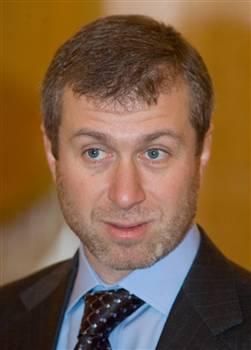
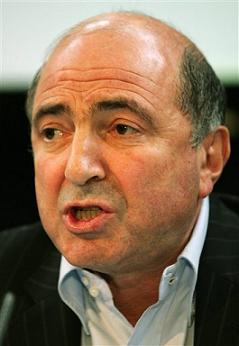
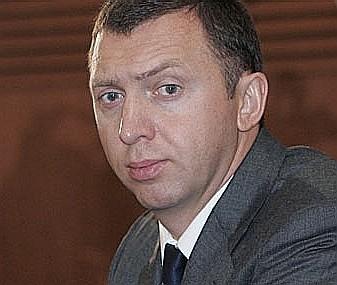
From left to right; Roman Abramovich, Boris Berezovsky and Oleg Deripaska - all-Jewish oligarchy plundering the goyim
Endnote
This affair illustrates how Jews, like the Rothschilds that have a German-Jewish background but are so-called well "assimilated" into British society, still hundreds of years later follow their Jewish nerve and global Jewish networks, in this case forming transnational bonds with Russian Jewry with corruption and shadowy dealings.
|
Races? Only one Human race United We Stand, Divided We Fall |
 |
No time to waste. Act now! Tomorrow it will be too late |
|

























